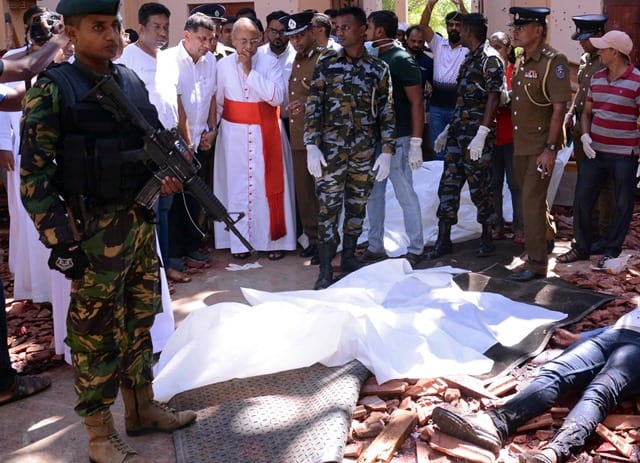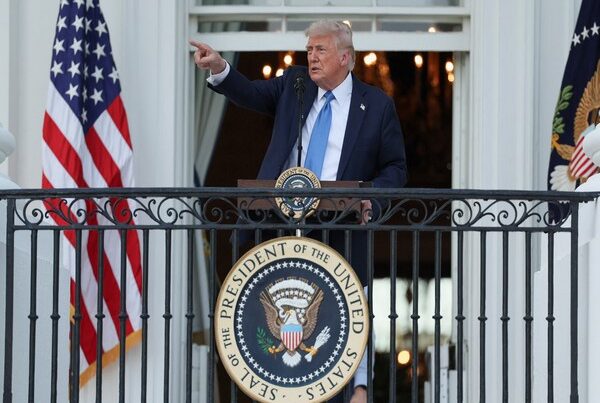
Easter Blasts Will Open New Fault Lines In Sri Lanka
Easter Sunday’s well-coordinated terror strikes, which ripped through three churches and high-end hotels in Sri Lanka, killing over 300 people, were a bolt from the blue for most of the world. The violence in the island nation was always ethnic, not religious. The Easter massacre bear a remarkable resemblance to copy-cat ISIS and Al Qaeda operations. After two days of counting the dead, ISIS finally claimed responsibility for the attack.
The Sri Lankan government has identified all the bombers as Sri Lankan citizens but authorities suspect foreign links. The sophistication of the serial blasts and the coordinates point to some level of international plot inspired by radical Islamic ideology and the world wide jihadi movement. Suicide bombers were used earlier by the LTTE while battling government forces in the past, but the targeting of Christians and the fact that five star hotels were attacked, clearly points to an attempt to kill westerners.
Whether the Sri Lankan investigators connect the dots or not, the fact remains that the local bombers would have been inspired by the international jihadi propaganda. There are numerous instances of lone wolf and group attacks across the Europe, Africa and Asia by those who wish to clone Al Qaeda and ISIS and hit out at Christians.
The Easter Sunday terror has come at a time when Sri Lanka was witnessing a period of peace and stability after decades of bloodletting during the ethnic conflict between Tamil rebels and security forces. This new threat could once again open old wounds in the island nation. The Tamil minority in the north and east are unhappy with all the tall promises made by Sirisena-Ranil Wickremasinghe government which remain unfulfilled. Tamils want closure to decades of abuse by bringing to book those responsible for largescale human rights violation during the military campaign that wiped out the LTTE leadership in 2009. It is suspected that elements that continue to support the LTTE may try to use the current mayhem to cooperate with local Islamic radicals in future. But it is more likely that with the government naming the local terror group Thowfeek Jamaath as the main perpetrators of the Easter Sunday strikes, a fresh fault line or communal discord between the majority Buddhists (over 70% of the population) and the minority Muslims. This outfit was also responsible for defacing Buddhist statues some time back.
Sinhala chauvinism which is at the heart of Sri Lanka’s ethnic conflict, was at its peak after the victory over the LTTE. Led by none other than President Mahinda Rajapaksa, triumphalism was all pervasive. A section of Sinhala-Buddhists, with newly acquired confidence, often got aggressive with minority groups. In the decade after the defeat of the LTTE, incidents of attacks on Muslims and Christians were reported intermittently.
Such things were unheard of in the past. In 2013, a Buddhist mob attacked a mosque in Colombo injuring 12 worshippers. There was communal tension for a while but the government was able to contain the situation. Buddhist monks once tried to disrupt a church service earlier this year. More than two dozen such incidents were reported including attempts to stop the service this year itself. Last year, 86 cases of discrimination, threats and violence against Christians were reported by the National Evangelical Alliance of Sri Lanka.
In the past, when the focus was primarily on the ethnic divide between Sinhalese and Tamils, Muslims and Christians faced little problem. In fact the 9.7% of Muslim minority in the Buddhist island nation is well integrated with both the majority Sinhala and Tamil communities. Muslims in Sri Lanka are mainly Tamil speaking. During decades of ethnic conflict, the Muslims largely kept equidistance from both sides, though some collaborated with the government. Others were caught in the conflict between the state and the LTTE. In the late 70s and 80s, the Israelis who were close to the United National Party, were called in to assist the Lankan intelligence agencies and train Tamil-speaking Muslims to spy on the LTTE. At that time, India was worried about the spread of Israeli and American influence in its immediate neighbourhood, especially as there was talk about the US setting up a listening post in Eastern Sri Lanka.
During that period, there were instances of LTTE attacks on new Muslim and Sinhala settlements in the Eastern province, where the government was hoping to dilute the Tamil majority status. Likewise the Christians, most of them Roman Catholics, who form 7.4% of the population, are also well integrated with both the Sinhalese and the Tamils. Thus the attack on Christians is unlikely to be owing to any local circumstances despite minor incidents earlier mentioned.
Clearly, like many Muslim youth across the world, the talk of the Caliphate by ISIS did ignite the imagination of Muslim boys in Sri Lanka. A few of them, around 33-35 travelled to Syria to fight with the ISIS warriors. The numbers were small compared to other countries; 6,000 went from Tunisia and 1,500 from France. With the collapse of the Caliphate and the ISIS on the backfoot through Syria and Iraq, many of the fighters are looking for safe and distant havens. South Asia is a good choice. Bangladesh, Sri Lanka, Maldives, Afghanistan and Pakistan are places to regroup.
While it is not known if any of the Sri Lankan Muslims involved in Sunday’s bloodbath were youngsters who may have returned from ISIS camps, there have been reports in recent years of some degree of radicalization of Muslim youngsters in Sri Lanka. Also, Saudi Arabia has been pouring in funds for mosques in the island state as the kingdom had been doing across South Asia. All this is helping to stamp the Islamic identity of Muslims of Sri Lanka. These factors will come into play in the next few months as Sri Lanka grapples with the current crisis.
It is difficult to predict how the situation finally pans out. The government has handled the situation well so far. It has clamped down on rumours and half-baked assumptions so as not to inflame passions or cause attacks on hapless Muslims. Yet, Sinhala hotheads are bound to strike back and therein lies the real worry of the government and the region. A period of communal tension appears to be on the cards for Sri Lanka. Will this Jihadi fight spill over to India and the rest of the South Asian neighbourhood is a question which would be worrying authorities in New Delhi. Maldives, a predominantly Sunni Muslim country, already has ISIS sympathizers and activists lurking in the shadows. Will these forces unite and shift their operations to India’s neighbourhood is a horrible prospect.



